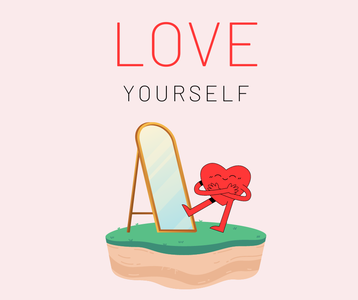 Recently I was on a walk with our dogs, Hank and Dexter. It was a warm, muggy morning, but the temperature hadn’t yet reached a point where we shouldn’t be out at all. The dogs were happy to be outside and getting ALL the sniffs in the neighborhood, and I was glad for some fresh air before resigning myself to another day indoors due to “heat dome 2023.” The walk had been going pretty well until we reached the final leg of our journey: 11th Street. If you know anything about 11th Street near my part of town, it is SORELY lacking sidewalks and a safe place to cross the street. Normally, we don’t bother crossing the street at all, walking instead on the grass of a couple neighbors’ yards near the curb. This day, however, one of the neighbors had their yard treated, and we were going to have to cross the street to walk safely on the grass on the other side. So we stood on the corner and waited. And waited. And waited for a break in the traffic. Finally, a medium-sized break in the traffic came, and my dogs and I started hurrying across the street. All of a sudden, the dogs got a whiff of something–either in the air or on the road–that caused one of them to zig and the other to zag RIGHT in front of me. I stumbled and flailed and skipped, trying desperately to remain upright, but I couldn’t do it. I landed SMACK DAB in the middle of the road on–of all things–my left knee. As I looked up, the pick-up truck that we had been trying to beat was getting closer and closer to the heap of my body and our dogs in the middle of the road. I scrambled again, this time to get up and with a great deal of pain, while the pick-up slowed down, leaving us enough room to safely cross to the other side of the road. I’ll save you the gory details. Suffice it to say, my left knee was throbbing and bleeding…and my pride was in a sorry shape as well. I was horribly embarrassed–hurting inside and out–so, naturally, I began berating myself under my breath. I called myself names, said things that are completely untrue like, “People are going to think that because I’m overweight I can’t even walk across the street,” or “I bet no thin person has ever looked so stupid.” I came up with theories about how people who “have it more together” (whoever they are) would never have any trouble walking two dogs at the same time, which wasn’t even the real issue anyway. All of that and more swirled in my mind in that short half-block back to our home. I wonder if you’ve ever spoken to yourself in a similar manner? Why do we do this to ourselves? Why do we treat ourselves in this way? Why, when we make a mistake or we stumble and fall (literally or metaphorically) do we speak to ourselves in a way we would NEVER speak to another? Why are insults and put-downs and harsh language our default when we do something as HUMAN as tripping, stumbling, falling, making a mistake, choosing the wrong path, or any number of other very human things? Why do we insist on meeting our embarrassment and shame with mounds of self-loathing?! I think it’s because we are vulnerable and, as a species, we don’t do vulnerability well. We try to avoid it by being perfect in some way, shape, or form, only to find that–inevitably–perfectionism is always out of our reach. But we beat ourselves up anyway, thinking that when we do it will keep us from feeling all of the discomfort and the messy emotions that vulnerability brings with it. Fun fact: It NEVER works out the way we think it will. Brené Brown says that the first step in overcoming shame is to speak to ourselves the way that we would speak to someone we love. I don’t know about you, but I would for sure NEVER speak to my spouse or my parents or my family members the way I sometimes speak to myself. I certainly wouldn’t speak to anyone I love the way I did that day in the street. I am reminded that Jesus gave us two commandments: 1) Love the Lord your God with all your heart and with all your soul and with all your mind and with all your strength; and 2) Love your neighbor as yourself. I think it’s easy to forget that last part: AS YOURSELF. And yet, I cannot help thinking that Jesus was onto something. Perhaps Jesus understood in a way that many of us are still learning that we cannot pour water from an empty pitcher. Sure, we can try. We can offer love and kindness to others that we wouldn’t extend ourselves, but such giving always breaks down. Either by completely depleting us, moving us toward an unhealthy hustling for our worth, or turning into a sort of performative martyrdom. The truth is that when we practice self-love and practice speaking to ourselves in kind and loving ways, that self-love fills our pitchers and KEEPS filling them. As we practice self-love and practice sharing that love over and over and over again, it creates a life-giving system of filling, pouring, and repeating. Certainly the world could use SO MUCH MORE of that than it could more self-deprecation and shame. So this week, friends, join me in going easy on yourself. Practice speaking to yourselves the way you would someone you love. Notice how it changes you…notice how it changes those around you. Learning to practice self-love with you, Pr. Melissa 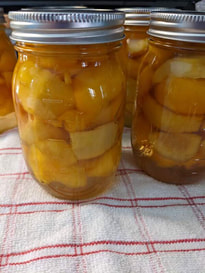 During vacation last week, my spouse and I put up about 20 lbs of peaches that we got from a local heritage farm. Once we had the peaches, the process was pretty simple: Peel, de-pit, slice, place in sterilized jars with a light syrup made of a simple water and sugar ratio. Then can the jars of peaches in a water bath for about 30 minutes. Remove the jars from the canner and wait for the glorious sounds of the metal lids to POP! The popping means the jar has been properly sealed for storage. The reason we put up things like peaches and pears and green beans and tomatoes and ALL of the delicious things we grow in our garden or get from local farmers we know is because, in addition to curb the effects of rising food costs on our household, we like to have control over what goes into our food. We want to know the people who grew the fruits or vegetables we didn’t grow ourselves. We want to learn of their farming practices. We want to be able to ask certain questions and trust the answers: Was this fruit sprayed with anything? How was the soil tended or treated? How did you deal with any pests? We can’t do this for everything we eat–particularly what we get in a restaurant or have to buy in a store–but we do it whenever we can. Which is interesting when I think about it because I am not nearly so discerning when it comes to what else I am taking in. That same day that we put up those beautiful heritage farm peaches, I had experienced about an hour of anxiety. Usually I know what’s causing an anxious moment or moments and I can tend to it, but at the time I had no clue. Looking back, I recounted the hour I spent on my phone, scrolling through social media, mindlessly taking in the perfect constructions of people’s lives that they put out for me to see. I looked at how they were spending their vacations and how their Friday nights were being spent, and then I looked at how I was spending my Friday night during my vacation. I started to compare what was–until that moment–exactly how I wanted to spend my Friday night during my vacation with the perfect constructions others were posting, and I started feeling inadequate…and less than. And in the swirl of those emotions, the anxiety set in. Perhaps this is exactly why Brene Brown says that “Comparison is the thief of happiness.” And it’s not just social media and the sanitized versions of others’ experiences that we are taking in, it’s also news stories and political ads (yes, already). It’s famous people sharing their opinions but not their wealth. It’s local politicians talking about making things beautiful without talking about making them safe for everyone. It’s the car accidents we pass on the highway and the person asking for money that we pass at the Walmart stop sign. We take it ALL in…often without a thought. And then we wonder when we get home why we have this constant sense of dread lingering around us. We feel anxious and isolated and powerless and often we aren’t at all sure why. Maybe it’s because of what we’re taking in? Now, I’m not at all advocating for us to hide our heads in the proverbial sand or to deny the situations unfolding around us, but I am suggesting that we all might benefit from developing a more discerning palette when it comes to what information or photographs or stories we allow into our consciousness. We might benefit from setting aside some time to research candidates in whatever political race is happening at the time so that we can turn off the ads when we see them. We might benefit from being more intentional about how often we watch the news, how long we allow ourselves to scroll through social media, and what conclusions we allow ourselves to draw from them. We might benefit from coming up–ahead of time–with a plan for what we can do (if anything) when we come upon a car accident–like call 9-1-1, do first aid, direct traffic until emergency personnel are there, or even just get out of the way–and then do those things when we see one. We might, if we are financially able, keep $10 or $20 in our vehicles to give to those asking for money when we see them or, if we can’t do that, we might keep the pastor’s cell phone number or the Ecumenical Cupboard hours on a sheet of paper in our glove boxes to offer as possible sources of help. In other words, it might benefit each of us to “put up” something--a plan, an intention, etc.--so that we can control what we are taking in and how we are taking it in from the world around us. And maybe that’s the challenge laid out for each of us: To find ways to “put up” goodness, kindness, compassion, service, faithfulness, justice, and love for when we find ourselves in need of them (which is nearly always). To construct our lives around questions of how we’re tending the soil of our hearts or treating the pests that enter our minds. Maybe the challenge is not so much about hiding or burying as it is about uncovering. Uncovering what we have control over and what we do not. Uncovering truths about ourselves and the world around us that we will never get from the local newscast. And, perhaps the most delicious of all, uncovering how God is already present in it all. Learning to put up more than just peaches with you, Pr. Melissa 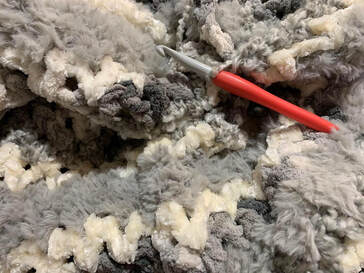 Some of you know that I met my spouse online. One of the things I loved about their profile was that they said that they were good at “pulling things together with sticks and string.” Since those early days, I have seen the ways these words have come to fruition in our daily lives. My spouse is excellent with a budget–they know how to scour the weekly grocery ads to find bundles and deals that make our grocery budget stretch. They are excellent with throwing meals together from what seems like nothing, and they are excellent at making old things new with a few learned skills, patience, and some ingenuity. But they are also EXTREMELY gifted in pulling things together with literal “sticks and string.” My spouse is a practitioner of the fiber arts. They knit, they crochet, they do cross stitch and they make quilts. When I complained about only ever owning afghans that covered mere halves of my body, my spouse measured me and made me a beautiful two-toned blue afghan that lets me tuck my chin AND my toes in. They made their father, a veteran of the Vietnam war, a quilt of valor, and their mother a flying geese-patterned quilt complete with an applique patch of the face of their mom’s late boxer, Mollie. They even attend a weekly local fiber arts group at the Oskaloosa Arts Center, led by our own Julia Fairchild, whenever they are able. Perhaps the thing that strikes me the most about ALL of this is the way in which fiber arts helps pull my spouse’s attention into the present with “sticks and string.” When they are trying to listen and really take in what is being said, my spouse does this best with a crochet, knitting, or cross stitch project in hand. When they want clear their mind from the clutter and the noise around them, a trip to the quilting room helps. Their presence is most fully brought to fruition when they have something to do with their hands. And it’s not just my spouse, I went to seminary with people who never took one note in class, but ALWAYS had some fiber arts project with them, helping them to be present. Even in social functions, these same students could be found chatting and stitching or hooking and looping–fully present. Fully absorbed in the moment. Conversations and classes–even worship services–weren’t things they just had to “get through,” they were opportunities for more fiber arts and for more presence. I don’t have that skill, and I don’t have the desire to cultivate fiber arts as a skill, but I do have a desire to be more present. I do have a desire to do more than just “get through” conversations, classes, and even worship services. I do have a desire to be more present to you, to what’s going on around me, and the work of God in, through, and around me…I wonder if you do too? In worship, I have found that closing my eyes during certain songs and responses grounds me and keeps me present. Outside of worship, I have found that closing my computer and turning off my phone helps me to be more present in meetings and in conversations. Being an active participant in conversations and asking lots of questions also helps me be more present. And as you know, in the mornings, it is the birds, a cup of coffee, and a rocking chair on our porch that tunes me into God, Creation, and what’s going on inside of me. Eckhart Tolle once wrote, “Realize deeply that the present moment is all you ever have. Make the Now the primary focus of your life.” I love that, and not only because I believe it to be true–that the present moment is all we ever have–but also because he doesn’t say how. The truth is we will all find myriad pathways to “the Now.” We will each find our own unique grounding in the present moment. We will each find what works for us to learn, to listen, to take in, to absorb. We will each find our own ways to do more than just “get through” the present moment–even when it feels like “getting through” is all we have the strength to do. We can and will find what uniquely grounds each of us there–in our worship, in our conversations, in our grief, and in our joy. And as we find what grounds us and practice it, the present moment becomes primary and, indeed, all that we have. My spouse does fiber arts. I close my eyes and ask questions. My mother twiddles her thumbs. Others doodle or use fidget objects. Others take deep breaths at key moments. There is no wrong way to be present to the present moment or to the Presence at work in our lives. And since church is one place where we can practice being present, I want to encourage you to do whatever you need to do to be present during worship, or church meetings, or rummage sales, or ice cream socials–whatever. If fiber arts help you be present in worship, bring your current project. If closing your eyes helps you be present, then join me in closing them as often as you need. If twiddling your thumbs, doodling on the bulletin, using a fidget object, or taking deep, loud, audacious breaths helps ground you in the present, then I’ll listen for you on Sunday morning. For it is our presence to one another, our truest selves, and to the One who is always present with us that saves us, that changes us, and that pulls us together when everything seems to be falling apart–even if it does so with sticks and string. I hope to see your "presence projects" on Sunday, Pr. Melissa 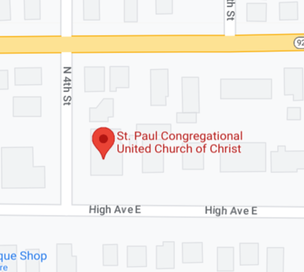 I grew up in a VERY liturgical ELCA (Evangelical Lutheran Church in America) church. That is to say, each week the hymns, scripture, and message would change, but the other elements were always the same. ALWAYS. Some people might find that boring, but I found it (and continue to find it) comforting. In fact, even after all this time and all this study, these are words that continue to find me. Always just in time. Always right right on time. ALWAYS. Just the other day, I found myself singing the Gospel Acclamation we used to sing before the reading of the gospel each Sunday when I was growing up: Alleluia. Lord to whom shall we go? You have the words of eternal life. Alleluia, Alleluia. The acclamation, based on John 6:60-69, comes from Peter's response to Jesus when, after a series of difficult and confusing teachings, a number of Jesus followers left the Jesus Movement. Jesus turns to the Twelve and asks, "Do you also wish to go away?" Peter answers, “Lord, to whom can we go? You have the words of eternal life. We have come to believe and know that you are the Holy One of God.” These words found me on a day when I found myself in difficult circumstances--down, tired, defeated, confused--and was wishing for a different life under different circumstances with a different career and different commitments. I was wishing for Sunday brunches instead of Sunday fellowship coffee and snacks. I was wishing to not have to wrestle with words and teachings that were written thousands of years ago. I was wishing to do life and faith in isolation--away from all of the other humans trying to do faith and life together. I wonder if any of you have similar days? Days when you wonder what on earth you're doing on Sundays while thinking of all of the ways you could be spending that time. Days when you wish for some other life or something other than the flawed, beautiful, difficult, challenging, and rewarding parts of community and your decision to do life together. I wonder if you ever think about leaving Church behind? I think if we get really honest, there are times when we all do. The problem in doing so for me is that Peter's words always find me. ALWAYS. "Lord, to whom can we go? You have the words of eternal life." The truth is that it is here where I have heard those words of eternal life spoken in me like nowhere else. Here is where I have wrestled with ancient words and inconvenient truths. Here is where the Spirit of the Living God keeps showing up for me--in this community--in other ordinary people just trying to make it through. Here is where God takes on flesh for me--in tales of loads of laundry, in communal laments about the current political climate, in prayer requests that break our hearts, in joys that nearly set our feet to dancing, in funeral lunches served and shared, in one deep, communal breath at the start of every service. Here--in this place, with the community gathered--is where I see God. ALWAYS. Where else would I go? One last thing: I know very well that there are good and faithful reasons to leave a church--abuse and damning theology are among the top reasons. I have left churches for those reasons in the past myself. I also know that community can be difficult. Jesus' teachings can be difficult. Questions of faith and the journey of a lifetime can be difficult. And because it's difficult, we NEED each other. If for no other reason, as Barbara Brown Taylor says, "than to save us from self-righteousness." Beloved community saves us. Beloved community holds us. Beloved community challenges us. ALWAYS. Learning to be held by Beloved community with you, Pr. Melissa |
Rev. Melissa Sternhagen
Rev. Melissa Sternhagen was called as the pastor of St. Paul Congregational UCC in June of 2020. Prior to her call to St. Paul, Pr. Melissa worked as a hospice chaplain in the Ames, IA area, following pastorates at rural churches in Central Iowa and Southern Illinois. Pr. Melissa is a second-career pastor with a background in agribusiness and production & supply operations. She received her M.Div. from Eden Theological Seminary in St. Louis, MO, and holds a MA Ed. in Adult Education and Training, and a BA in Organizational Communications. Archives
July 2024
Categories |
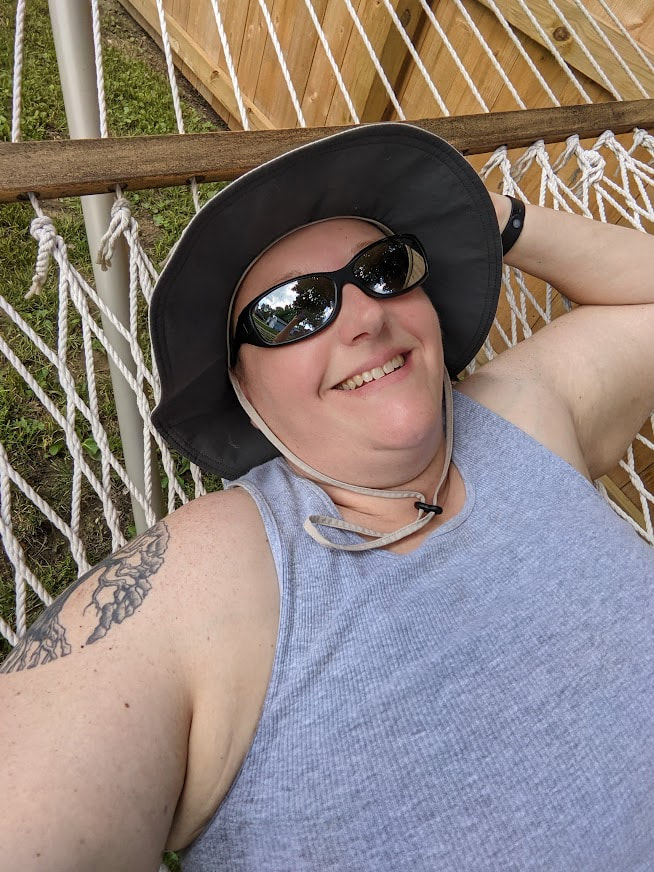
 RSS Feed
RSS Feed
